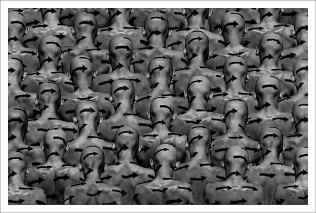•
the Blog
The most important quality of a scientist
By Guillaume Filion, filed under
science,
management,
opinion.
• 15 September 2020 •
 When I established my lab and started to recruit people, I thought that it would be interesting to gather some information about what makes a good or a bad scientist. To this end, I designed a short questionnaire with eight questions. There was no right or wrong, nor even a preferred answer. Those were just questions to help me know the candidates better.
When I established my lab and started to recruit people, I thought that it would be interesting to gather some information about what makes a good or a bad scientist. To this end, I designed a short questionnaire with eight questions. There was no right or wrong, nor even a preferred answer. Those were just questions to help me know the candidates better.
The first question was “What is the most important quality of a scientist?” I had no particular expectation. Actually, I did not even know my own answer to this question. As it turned out, most candidates answered that it was either creativity or persistence.
If you have been in science for even a short while, you know why this makes sense. We have complicated problems to solve, so creativity and persistence are important. Yet, I was not convinced that a good scientist is someone who is either very creative or very persistent. The reason is that neither of these qualities defines a scientist. Artists, politicians, business people, social workers and pretty much everyone else greatly benefits from being creative or persistent.
Having spent more time with scientists, I came to find the answer to my...
Against recruitment panel interviews
By Guillaume Filion, filed under
recruitment,
management.
• 27 January 2017 •
 In my first years as a group leader, I had the chance to interview PhD candidates in panels at international calls for students. I quickly stopped interviewing students, but back then I was very surprised that the top candidates often proved less productive than those we had ranked mediocre. How was this possible at all? Panels are unbiased, they combine multiple expertises, they allow for critical discussion, so they should be able to pick the best candidates... right?
In my first years as a group leader, I had the chance to interview PhD candidates in panels at international calls for students. I quickly stopped interviewing students, but back then I was very surprised that the top candidates often proved less productive than those we had ranked mediocre. How was this possible at all? Panels are unbiased, they combine multiple expertises, they allow for critical discussion, so they should be able to pick the best candidates... right?
It turns out to be less surprising than I thought. Now a little more familiar with the dangers of panel interviews, I decided to see what our colleagues from the academia have to say about it. This is of course where I should have started before interviewing PhD students, but better late than never. If you haven’t met them, let me introduce you to the flaws of the mighty recruitment panel interview...
1. The unproved efficiency of panels
A good place to start. Despite forty years of research, the benefit of recruitment panels over single evaluators is still debated. According to a review published in 2009
Findings to date suggest that panel interviews might not necessarily provide the psychometric...
Three lessons from peer coaching
By Guillaume Filion, filed under
motivation,
management,
coaching,
leadership.
• 09 January 2017 •
 For a little more than a year, my colleagues and me have been organizing peer coaching sessions for junior group leaders. A typical session consists of four to six of us, and we meet for one morning to discuss the most pressing issues. After a start-up training and some trial and error, we settled for a group coaching method that gave the best result. To give an idea, the “coachee” tells the chairman what he/she wants to solve, then follows a discussion where he/she explains the facts to the coaches who ask as many question as possible. Then the coaches analyze the situation, suggest solutions and make comments meanwhile the coachee has to remain silent and listen. Finally, the coachee summarizes what he/she heard and what steps he/she will take.
For a little more than a year, my colleagues and me have been organizing peer coaching sessions for junior group leaders. A typical session consists of four to six of us, and we meet for one morning to discuss the most pressing issues. After a start-up training and some trial and error, we settled for a group coaching method that gave the best result. To give an idea, the “coachee” tells the chairman what he/she wants to solve, then follows a discussion where he/she explains the facts to the coaches who ask as many question as possible. Then the coaches analyze the situation, suggest solutions and make comments meanwhile the coachee has to remain silent and listen. Finally, the coachee summarizes what he/she heard and what steps he/she will take.
With this exercise, we learned a great deal about how to organize such peer coaching sessions in the academia and how to make the best of them, but this is not what this post is about. Instead, I would like to share more important lessons I have learned about working together and using the group as support and source of motivation.
If you...
How to teach research?
By Guillaume Filion, filed under
motivation,
management,
leadership.
• 28 February 2016 •
 One of my students once asked me how to become a better researcher. “Great question!” I thought. Instead of a straight and clear answer, I heard myself babbling, as happens when you have no idea what you are talking about. Somewhat disappointed by my non answer, I turned to my colleagues and asked how they teach research. The answer ranged from embarrassed silence to politely switching topic. Strange, I thought, it is our responsibility as principal investigators to educate the junior researchers of our group, so we’d better have some idea of what we are doing.
One of my students once asked me how to become a better researcher. “Great question!” I thought. Instead of a straight and clear answer, I heard myself babbling, as happens when you have no idea what you are talking about. Somewhat disappointed by my non answer, I turned to my colleagues and asked how they teach research. The answer ranged from embarrassed silence to politely switching topic. Strange, I thought, it is our responsibility as principal investigators to educate the junior researchers of our group, so we’d better have some idea of what we are doing.
We have a fairly good idea of how to teach skills, like mathematics, molecular biology etc. But I would argue that research is not a skill. I would argue that it is an attitude. So the real question is how to teach an attitude. There is no foolproof recipe, but here goes a subjective view that I gathered from reading, from discussions and from personal experience.
1. Motivate the change
Most students and junior scientists enter the lab with an open mind, ready to learn as many new things as possible. But most of them focus on learning technical skills (at...
Four illusions
By Guillaume Filion, filed under
motivation,
management,
illusions,
leadership.
• 28 February 2014 •
 Optical illusions come in two flavors. The one shown on the left is a classical example of a “false” perception. It looks like the grey lines are curved, but they are actually perfectly horizontal. Even if we know that the lines are horizontal, we cannot force ourselves to see them this way. I find it somewhat of a miracle that reason is strong enough to tell that the eyes are lying, but still, however long you stare at the picture, you will never see it the right way. The brain cannot learn to see this picture.
Optical illusions come in two flavors. The one shown on the left is a classical example of a “false” perception. It looks like the grey lines are curved, but they are actually perfectly horizontal. Even if we know that the lines are horizontal, we cannot force ourselves to see them this way. I find it somewhat of a miracle that reason is strong enough to tell that the eyes are lying, but still, however long you stare at the picture, you will never see it the right way. The brain cannot learn to see this picture.
 The second flavor of optical illusions is shown on the right. This picture may either represent the face of a woman, or a saxophone player. Most people immediately see one of those, and it may take them some time to see the other. But once they see it, there is no way to “unsee” it. The brain has completely forgotten how it feels to not see it and cannot unlearn to see the picture.
The second flavor of optical illusions is shown on the right. This picture may either represent the face of a woman, or a saxophone player. Most people immediately see one of those, and it may take them some time to see the other. But once they see it, there is no way to “unsee” it. The brain has completely forgotten how it feels to not see it and cannot unlearn to see the picture.
Vision is not the only sense that can be fooled. As a matter of fact, what is so special about optical illusions is that we realize that something...
So you want to be a group leader
By Guillaume Filion, filed under
motivation,
management,
leadership.
• 21 January 2014 •
People often ask me whether it is difficult to be a group leader. I usually answer “No that’s easy. Being a good group leader... that’s another story.” It is one of these jobs for which there is no training. It is also one of these jobs about which there is no information. As the leader of a team of scientists, you will have to face your problems alone, because scientific leadership is...
The best kept secret in the world
 The need for solid leadership skills is fully acknowledged in the civilized world, but in academic research this culture is lagging behind. So far behind that we have to admit the plain truth: leadership in science is a taboo. Understandably, academic researchers are reluctant to share their experience because they have little authority to do so, and because the information is often confidential. I could tell how I solved “the case of a post-doc of mine who put his music too loud in the lab”, but since all my colleagues would identify this person, I would end up with a serious issue in my team.
The need for solid leadership skills is fully acknowledged in the civilized world, but in academic research this culture is lagging behind. So far behind that we have to admit the plain truth: leadership in science is a taboo. Understandably, academic researchers are reluctant to share their experience because they have little authority to do so, and because the information is often confidential. I could tell how I solved “the case of a post-doc of mine who put his music too loud in the lab”, but since all my colleagues would identify this person, I would end up with a serious issue in my team.
There are also systemic reasons for this lack of culture. Academic...

